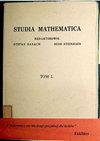同步游戏产品
IF 0.9
3区 数学
Q2 MATHEMATICS
引用次数: 2
摘要
我们证明了两个同步对策乘积的*-代数是相应*-代数的张量乘积。我们证明了乘积对策有一个完美的C*-策略,当且仅当每个单独的对策都有,并且在这种情况下,乘积对策的C*-代数与单独的C*代数的最大C*-张量积是*-同构的。我们提供了同步对策的例子,其同步值是严格超乘的。本文章由计算机程序翻译,如有差异,请以英文原文为准。
Products of synchronous games
We show that the *-algebra of the product of two synchronous games is the tensor product of the corresponding *-algebras. We prove that the product game has a perfect C*-strategy if and only if each of the individual games does, and that in this case the C*-algebra of the product game is *-isomorphic to the maximal C*-tensor product of the individual C*-algebras. We provide examples of synchronous games whose synchronous values are strictly supermultiplicative.
求助全文
通过发布文献求助,成功后即可免费获取论文全文。
去求助
来源期刊

Studia Mathematica
数学-数学
CiteScore
1.50
自引率
12.50%
发文量
72
审稿时长
5 months
期刊介绍:
The journal publishes original papers in English, French, German and Russian, mainly in functional analysis, abstract methods of mathematical analysis and probability theory.
 求助内容:
求助内容: 应助结果提醒方式:
应助结果提醒方式:


